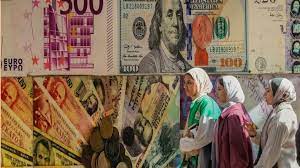Egyptian pound steady after day of tumult as bankers report dollar flows unseen in months

Collected Image
Egypt's pound was mostly steady against the US dollar on Thursday, a day after it plunged to a historic low, with bankers reporting the flow of millions of dollars through the country's interbank market since Wednesday.
The pound slumped to as low as 32.20 to the dollar on Wednesday, from 27.60 at the open of trade, its biggest drop since a devaluation in March.
The pound is still the world’s worst performer this year and measures of short-term historical volatility show the swings are the most extreme globally.
Wednesday's plunge paralysed the usually busy black market, with one trader saying there was very little activity on Wednesday and Thursday. "There's no buying or selling," he told The National.
Meanwhile, bankers said more than $800 million was traded in the interbank market on Wednesday. At least $160 million was traded by lunchtime on Thursday, they said. Previously, the average daily amount traded was about $150 million.
There were also signs of international institutions pouring money into Egypt ahead of Thursday's auction of local treasury bills, according to bankers cited by Egypt's official Mena news agency.
More than $250 million flowed into the market from international institutions on Wednesday, the report said.
These investors had been largely absent since March, when they hurriedly pulled out of Egypt's once-lucrative debt market in the aftermath of the Russia-Ukraine war, taking $20 billion with them.
It made a significant contribution to a foreign currency shortage that continues to this day.
Also a factor is a slump in tourism revenue — Russians and Ukrainians normally account for 30 per cent of all Egypt's visitors — and a higher import bill caused by the conflict.
The pound has lost more than 50 per cent of its value since March — it traded around 16 to the dollar a year ago — and inflation crept up to more than 20 per cent in December.
The combined effect of that has left millions of poor and middle-class Egyptians struggling to make ends meet in the face of surging prices.
It has also forced the government to introduce austerity measures and to spend billions to help the most vulnerable.
The pound slumped to as low as 32.20 to the dollar on Wednesday, from 27.60 at the open of trade, its biggest drop since a devaluation in March.
Read More : Egypt's private sector caught off guard by central bank move to cut financial aid scheme
It rebounded to 30.55 at midday on Thursday but later settled at slightly under 30 after swinging between gains of more than 1 per cent and losses of 3 per cent through the day.The pound is still the world’s worst performer this year and measures of short-term historical volatility show the swings are the most extreme globally.
Wednesday's plunge paralysed the usually busy black market, with one trader saying there was very little activity on Wednesday and Thursday. "There's no buying or selling," he told The National.
Meanwhile, bankers said more than $800 million was traded in the interbank market on Wednesday. At least $160 million was traded by lunchtime on Thursday, they said. Previously, the average daily amount traded was about $150 million.
There were also signs of international institutions pouring money into Egypt ahead of Thursday's auction of local treasury bills, according to bankers cited by Egypt's official Mena news agency.
More than $250 million flowed into the market from international institutions on Wednesday, the report said.
These investors had been largely absent since March, when they hurriedly pulled out of Egypt's once-lucrative debt market in the aftermath of the Russia-Ukraine war, taking $20 billion with them.
It made a significant contribution to a foreign currency shortage that continues to this day.
Also a factor is a slump in tourism revenue — Russians and Ukrainians normally account for 30 per cent of all Egypt's visitors — and a higher import bill caused by the conflict.
The pound has lost more than 50 per cent of its value since March — it traded around 16 to the dollar a year ago — and inflation crept up to more than 20 per cent in December.
The combined effect of that has left millions of poor and middle-class Egyptians struggling to make ends meet in the face of surging prices.
It has also forced the government to introduce austerity measures and to spend billions to help the most vulnerable.
Source: https://www.thenationalnews.com
Previous Story
- IMF will help Egypt close $17bn financing gap...
- Tutankhamun's inspiring 21st Century afterlife
- COP27 does little for next month's global agenda:...
- Oil pollution: Investigation reveals Egypt’s 'super coral' at...
- Forensics reveal stunning face of ancient Egypt's 'Mysterious...
- Egypt and IMF reach deal for $3bn loan
- Egypt announces car import scheme for citizens living...
- Egypt’s natural gas exports value increases 13-fold in...